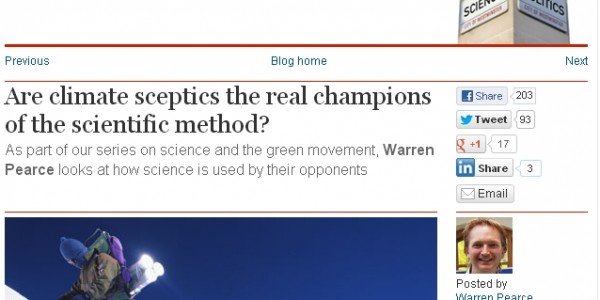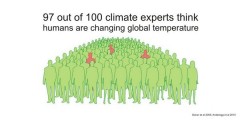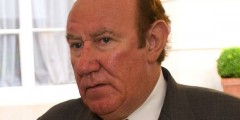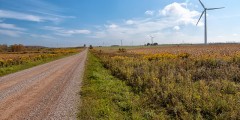Are climate sceptics the real champions of the scientific method?
August 12, 2013
At the Science in Public conference, which we hosted in July, Alice Bell convened a panel on science and the green movement. Following the conference Alice asked me to contribute to a series of posts on the same theme for the Guardian’s Political Science blog, focusing on my research area of climate scepticism. The post …
Geoengineering and the (un)making of the world we want to live in
July 31, 2013
This post was written by Rusi Jaspal and Brigitte Nerlich. It was was originally published on GeoLog, the European Geoscience Union’s official blog Geoengineering promises to alter global climate patterns and thereby avoid the potentially catastrophic consequences of climate change. Implementing various types of climate engineering options is a huge, but still mainly speculative, technological …
An accurately informed public is necessary for climate policy
July 29, 2013
This is a guest essay by Dana Nuccitelli Last week, the Making Science Public blog published a guest post by Ben Pile, What’s behind the battle of received wisdoms?, which focused on Andrew Neil’s interview with Ed Davey on BBC Sunday Politics and my articles at The Guardian discussing the scientific errors Neil made on …
What’s behind the battle of received wisdoms?
July 23, 2013
This is a guest essay by Ben Pile, a writer for Spiked Online and his own blog Climate Resistance. There is a response by Dana Nuccitelli from the Guardian’s Climate Consensus blog here. Andrew Neil’s interview with Ed Davey on the Sunday Politics show last week caused an eruption of comment. For sceptics, it was a refreshing …
Extreme weather talk: Making climate public?
June 19, 2013
This is yet another in a series of blog posts where I try to show how one can use publicly available data (newspaper databases or Google Insight for Search) to observe patterns and shifts in public attention to climate change. Other posts have dealt with some first reflections on extreme weather, Hurricane Sandy, alarmism, carbon …
Mitigation, adaptation, geoengineering: Patterns of discourse, patterns of mystery
June 5, 2013
This blog relates more to an ESRC project on climate change than to the Leverhulme project on climate change and scepticism, but I think there is a tangential link. As part of the ESRC project, we are interested in finding patterns in climate change communication and policy over time and across countries. In that context …
Debating empty chairs: creationism, climate and public engagement
May 17, 2013
This week, Making Science Public has been very proud to welcome US film director Jeff Tamblyn during his UK visit. On Wednesday we screened his amazing film, Kansas vs Darwin, a documentary charting the attempts by members of the Kansas School Board to introduce creationism and intelligent design into high school science teaching. The film …
Families of climate scepticism I: faulty science?
April 12, 2013
At last week’s British Sociological Association conference, I presented some initial observations from my research on climate change scepticism. My starting point was that climate change scepticism – or as it is often inaccurately described, denial – is not monolithic. Those people typically labelled as sceptics vary in their arguments. Sometimes may employ many different arguments, some may focus on …
Public understanding of climate change: The deficit fallacy
April 7, 2013
At the end of February the House of Commons Science and Technology Select Committee launched an inquiry into public understanding of climate change and its implications for policy. The STSC asks for written submissions on various questions, such as: What is the current state of public understanding of what is meant by climate change? How …
Competitive risk promotion: A historical assessment
March 27, 2013
This is a guest blog post by Adam Burgess, who specialises in the sociology of risk (University of Kent, School of Social Policy, Sociology and Social Research) I’d like to take up where Brigitte left off in her blog post about the antibiotic apocalypse and very schematically draw attention to what I would describe as …










